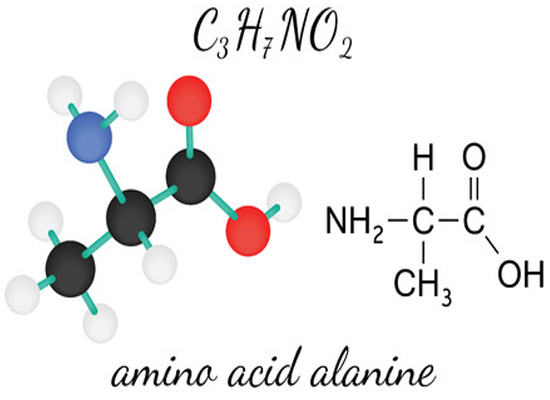Male Supplements
Get Cutting Edge Herbal Supplements for Men
No Subscriptions - No Monthly Billing - Buy What You Need When You Need It!
Activate 15% Discount
Learning About Amino Acids - Alanine
Alanine, which is also known as L-alanine, is an amino acid that helps convert glucose into energy. It also helps release toxins from the body. Amino acids are necessary for building protein. Alanine also helps prevent the cells from being damaged by aerobic activity.
L-alanine, Amino Acid Converts Glucose into Energy
Alanine helps preserve the balance of glucose and nitrogen. This is necessary for the alanine cycle. Excess amino acids in the tissues or cells are transferred to pyruvate. This is a receptor molecule that is produced when glucose is broken down. Nitrogen is extracted from alanine by the liver. The liver will then convert some of the alanine back into pyruvate. Excess nitrogen will then be converted into urea and then urinated out of the body.
Alanine helps maintain optimal glucose
Alanine helps maintain optimal glucose in the body. That is why it is necessary for supplying the body with energy. Chronic fatigue and Epstein-Barr have been linked to high alanine levels and low phenylanine and tyrosine. Alanine can also help regulate blood sugar. Studies have shown that taking L-alanine can help treat hypoglycemia in people who suffer from insulin-dependent diabetes.
Alanine is considered a non-essential amino acid. This means that the body can produce the substance on its own. However, every amino acid is considered essential if the body cannot produce it anymore. Supplementation is required if the body cannot produce amino acids.
Low Alanine Levels Could be Linked to Diabetes, Hepatitis and Hypoglycemia
People who have eating disorders, liver disease, genetic conditions and Urea Cycle disorders may be required to take an alanine supplement. Many patients who have diabetes, hepatitis and hypoglycemia are more likely to have low alanine levels. It is not known whether low alanine levels cause those conditions.
The body cannot process the B vitamins, such as vitamin B5 and vitamin B6, without alanine. There has been evidence to suggest that alanine can treat benign prostatic hyperplasia. Researchers have found that prostate fluid contains alanine. One study showed that people who took 780 milligrams of glycine, alanine and glutamic acid two times every day for two weeks and then 390 milligrams of the amino acids every day for the 2.5 months noticed a reduction in BPH symptoms.
Protein Rich Foods are Great Sources of Alanine
Fish, poultry, meat and eggs are great sources of alanine. Avocados and other foods that are rich in protein are great sources of alanine. There are also alanine supplements. However, it is important to note that taking too much of any amino acid can cause a nitrogen imbalance. This can make it harder for the kidneys and liver to excrete waste.
- Do Supplements Like Glucosamine and Chondroitin Help Knee Pain and Arthritis?
- Chinese Herbal Supplements Horny Goat Weed Epimedium
- Polyphenols Key to Green Tea's Rich in Antioxidants
- Chondroitin and Glucosamine Osteoarthritis
- Why is my Sexual Desire Decreasing with Age?
- Boost Your Sex Drive with this Invaluable Guide
Click to see more articles from Mark
